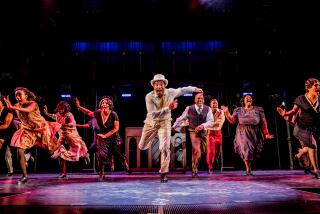‘The Last Night of Ballyhoo’ at La Mirada Theatre
What’s a Southern matriarch to do when her only daughter’s too kooky to snag a man? Boo Levy (Ellen Crawford) is making plans and provisions for her offspring to shine at Ballyhoo, one of Atlanta’s essential social events. Too bad Lala (Stacy Barnhisel) has a head full of fantasy and a curious habit of getting on people’s nerves.
So far, so “Glass Menagerie.” But in Alfred Uhry’s “The Last Night of Ballyhoo,” now playing at La Mirada Theatre for the Performing Arts, there are two daughters and two gentleman callers, and everyone’s a member of the tribe. Lala’s cousin, Sunny Freitag (Kate Steele), a knockout blond attending Wellesley, dismisses Ballyhoo as “a lot of dressed-up Jews . . . wishing they could kiss their elbows and turn into Episcopalians.” Trouble is, she’s practically a Gentile herself. The Freitag-Levy clan decorates a Christmas tree, can’t pronounce the word “Seder” -- let alone actually hold one -- and belongs to a country club that frowns on “the other kind” (immigrants from Eastern Europe shtetls). When bluff go-getter Joe (Gregory Sims) moves to town from Brooklyn and falls hard for Sunny, meshugas aplenty ensues when no one can agree on just what constitutes being a good Jew.
“Ballyhoo,” which won the 1997 Tony Award for best play, is set in 1939 -- “Gone With the Wind” is premiering when the curtain rises -- and feels like it could have been written back then as well. This is an old-fashioned play in which nice young people wear hats and meet on trains, and a household of women fusses about corsages and pot roast while the men dream of a moment of peace to read the evening paper.
That said, Uhry, who wrote “Driving Miss Daisy,” always adds a dash of social critique to his Dixie punch. The Freitag-Levy household has placed its faith in assimilation -- the family members believe it will assure them emotional and financial prosperity -- and the play critiques its myopia. But Uhry can’t quite decide whether he wants to reassure the audience or take it to uncertain places; he has so much affection for his characters that he doesn’t want them to suffer too much. The result is very gentle comedy -- as cozy as a pair of slippers but missing a little kick.
This easygoing production plays by Uhry’s rules, if occasionally overstating the case -- does Lala’s love interest, Peachy (James Leo Ryan), really have to look like a Katzenjammer kid? The cast stomps and dithers around John Iacovelli’s spacious living room set with comic appeal.
The real pleasure of the evening is Michael Rothhaar’s Uncle Adolf, a great walrus of a man with a bristle mustache and a massive girth seemingly acquired to buffer female foolishness. Rothhaar nails his comebacks with a master’s unhurried confidence and delivers the evening’s most beautiful monologue, about a beautiful young woman he fell in love with without ever speaking to. (Director Jules Aaron is particularly adept with the play’s more wistful moments.)
No prizes for guessing whether Sunny and Joe manage to talk out their differences. The grown-ups of “Ballyhoo” didn’t get all they wanted, but there is always another generation. Hitler stands in the shadows, of course, but Uhry doesn’t give him much stage time. The playwright just wants to smile ruefully at his foolish, wonderful relatives, sweet figures of a bygone era.
More to Read
Get the Latinx Files newsletter
Stories that capture the multitudes within the American Latinx community.
You may occasionally receive promotional content from the Los Angeles Times.






